Ontario PCs lead by 7: Ford’s negative rise as leaders are set to debate
May 16, 2022
As the four main party leaders prepare to debate tonight, we completed our second survey of the Ontario election campaign yesterday interviewing 1,000 eligible voters.
Here’s what we found:
RACE TIGHTENS: PCs LEAD BY 7 OVER THE LIBERALS. NDP AT 24%.
If the election was held today, the PCs would win the popular vote easily over the Ontario Liberals. Overall, among all committed eligible voters in our survey, the PCs have 35% of the vote (down 3) with the Ontario Liberals at 28% (down 1) and the Ontario NDP at 24% (up 2). The Ontario Greens are at 5% while other parties get 7% of the vote.
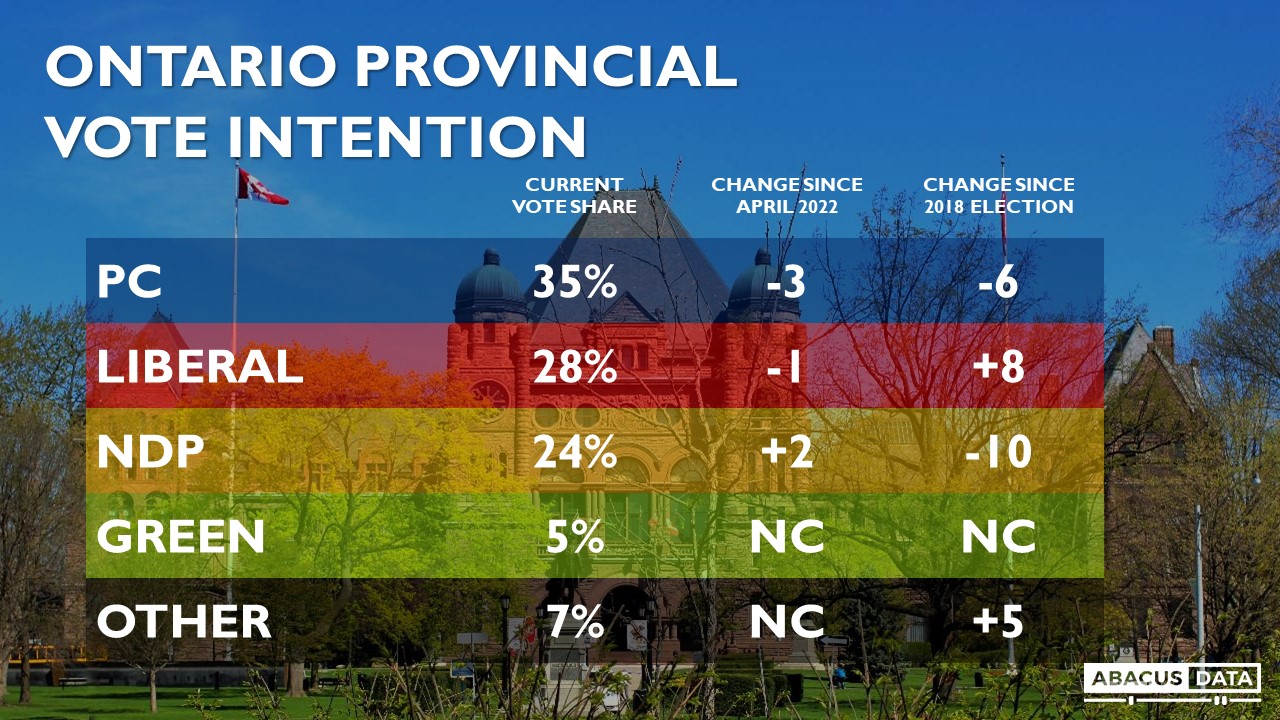
Regionally, we find the PCs trailing the Liberals in Metro Toronto, but ahead in the GTHA (postal code starts with L), and leading by a wide margin in eastern and southwestern Ontario.
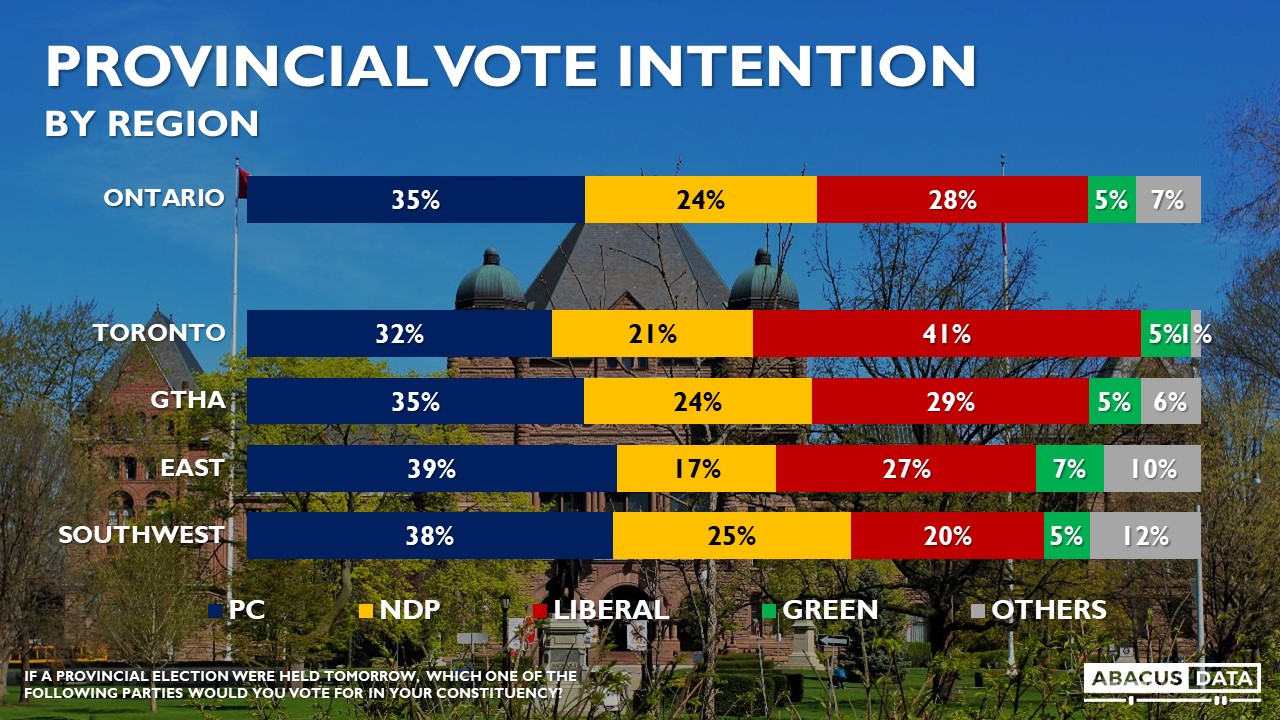
The PCs also lead among eligible voters over 44 with a 14-point lead among those 60+, and a 15-point lead among those aged 45 to 59. The Liberals are slightly ahead among those aged 30 to 44 while the NDP and Liberals are tied among those under 30.
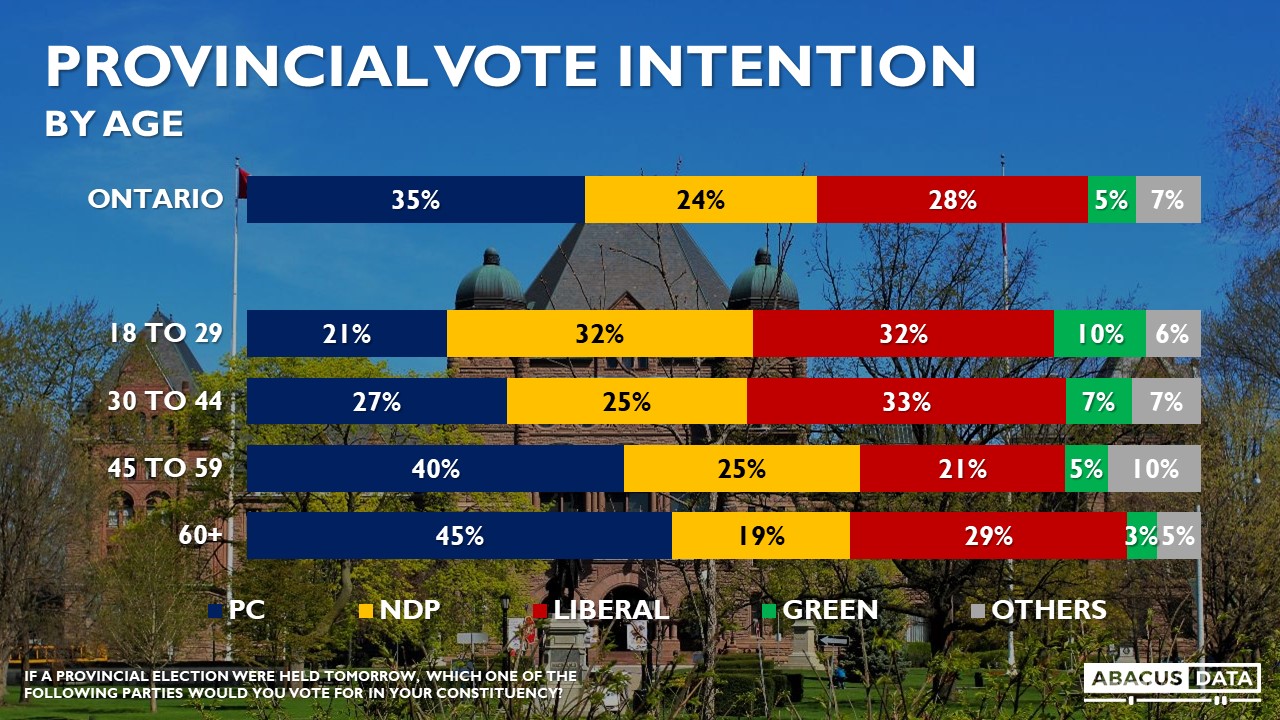
Among those most likely to vote, the gap between the PCs and Ontario Liberals grows to 12-points with the PCs at 39%, the Liberals at 27%, and the NDP at 23%.
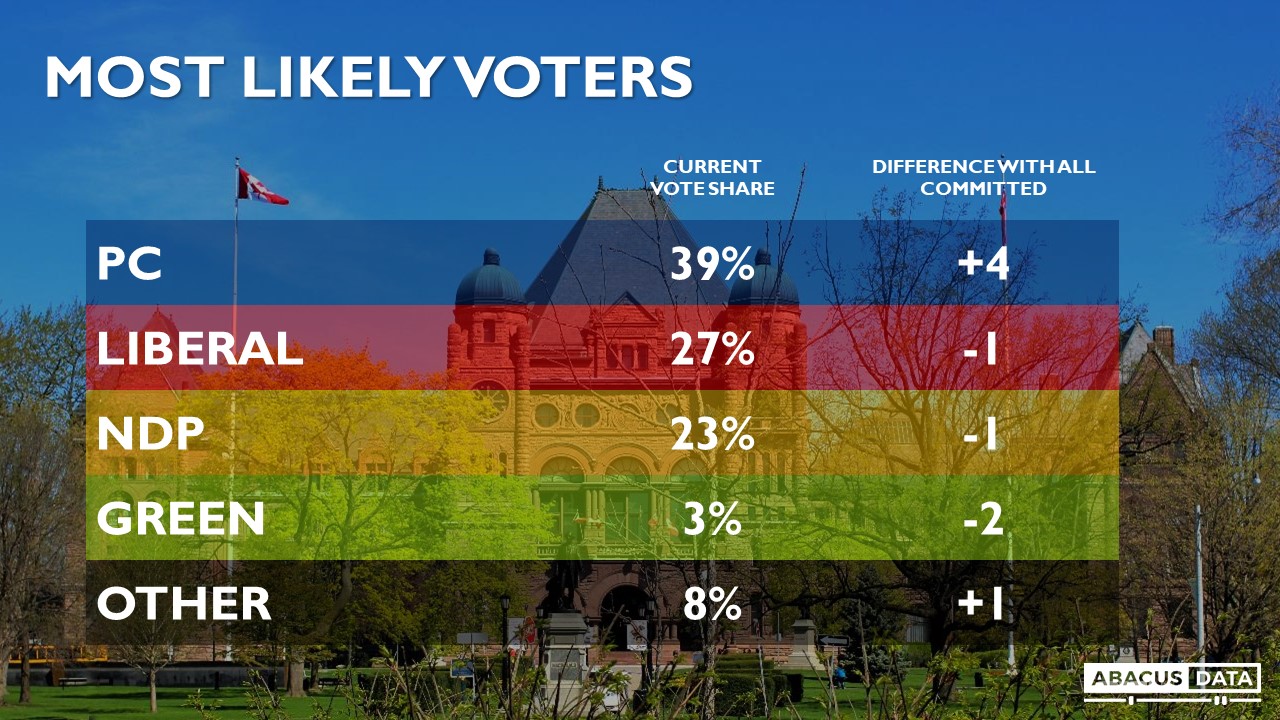
WHAT SHOULD WE BE WATCHING CLOSELY?
#1 – Will attention to the campaign increase? Right now, few are paying that much attention to the campaign so far.
When asked how closely they are following the election campaign, 49% are following it very or somewhat closely while 51% are following it only a little, not at all, or didn’t even know there was an election.
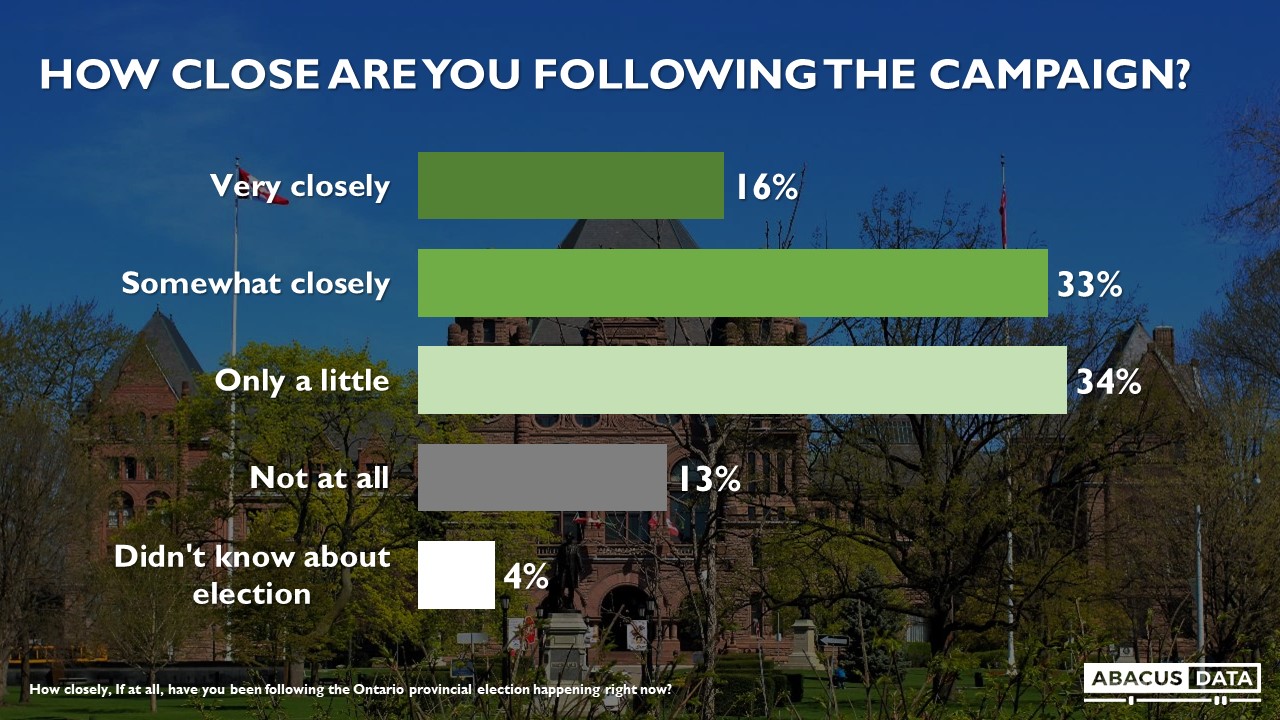
The PCs lead by 4 among those following the election closely and by 14 among those following it somewhat closely. They also lead by 4 among those following it only a little.
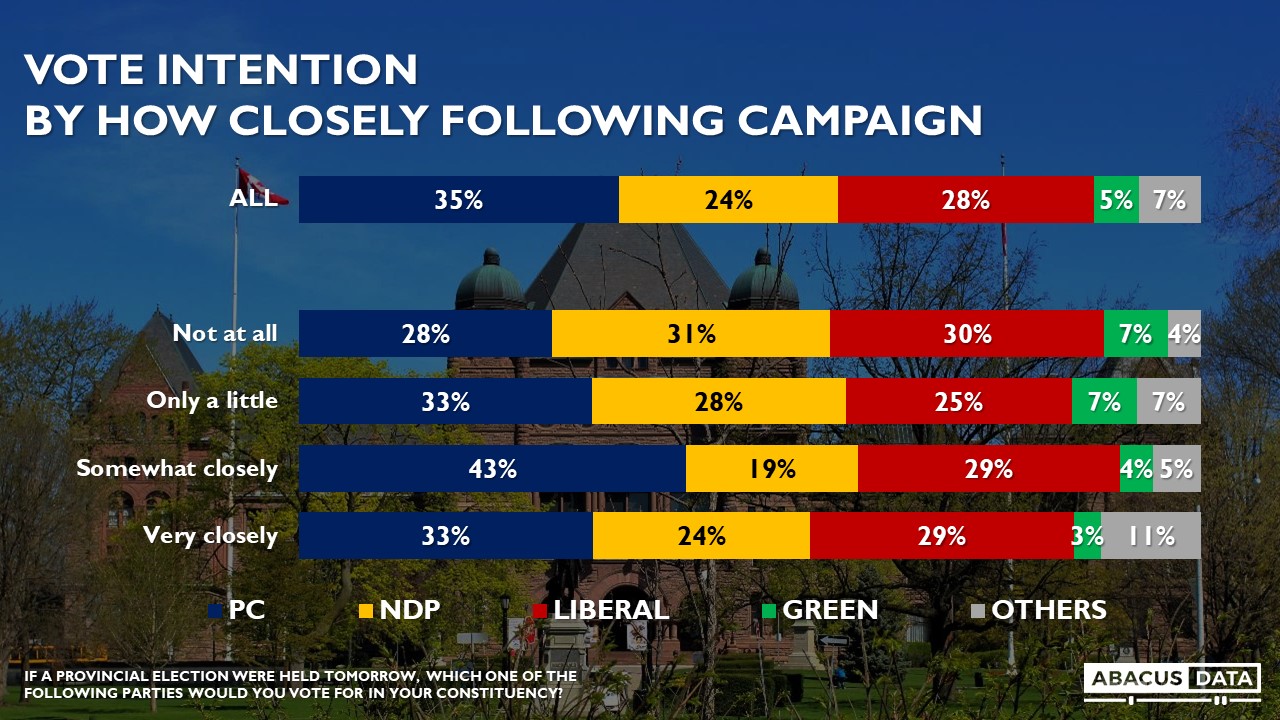
#2 – Will the desire for change increase? We see a slight uptick over the past week.
Over the past week, those definitely wanting to see a change in government have increased marginally by 3-points to 52% while those wanting to see the PCs definitely re-elected has held steady.

The desire for change in Ontario is far lower than the week before the 2018 provincial election but is now slightly higher than in the final weekend of the 2021 federal election.
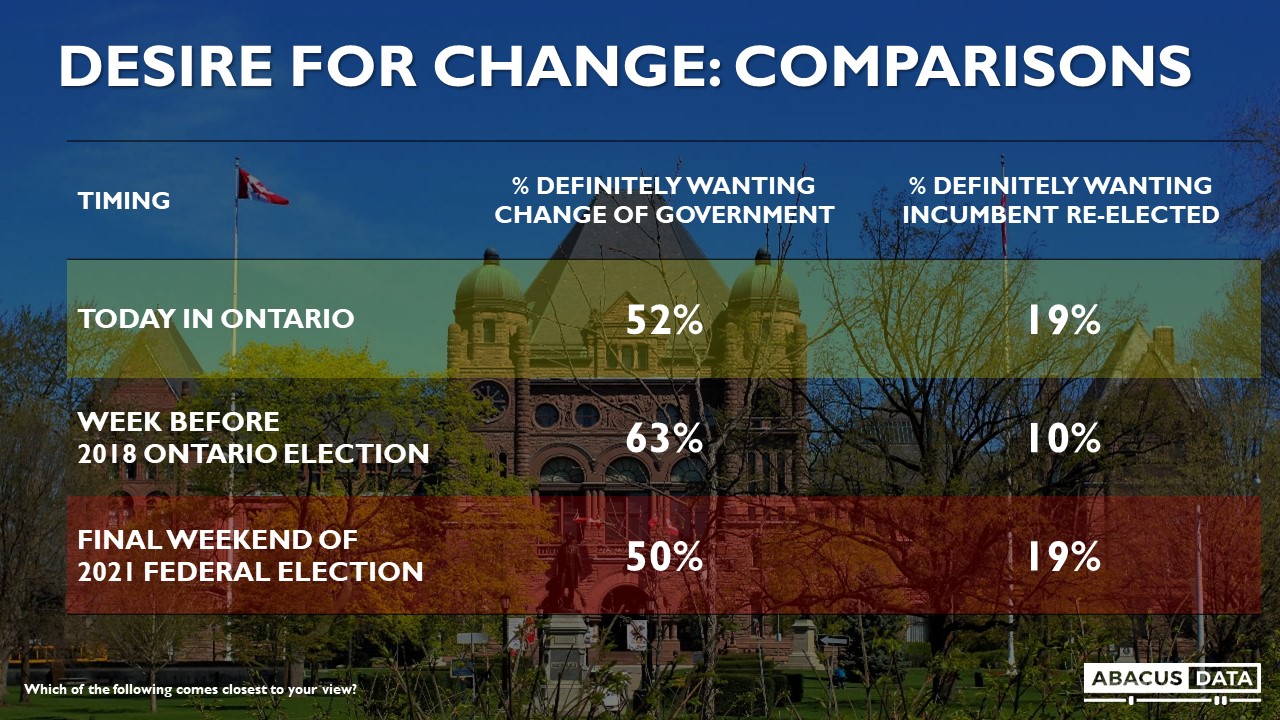
Among those change voters, the NDP has now opened up a 5-point lead over the Liberals (39% to 34%). Last week, the Ontario Liberals were slightly ahead. But the key insight is that change voters remain largely divided between the alternatives to the PCs. This is allowing them to maintain a lead and their advantage for re-election.
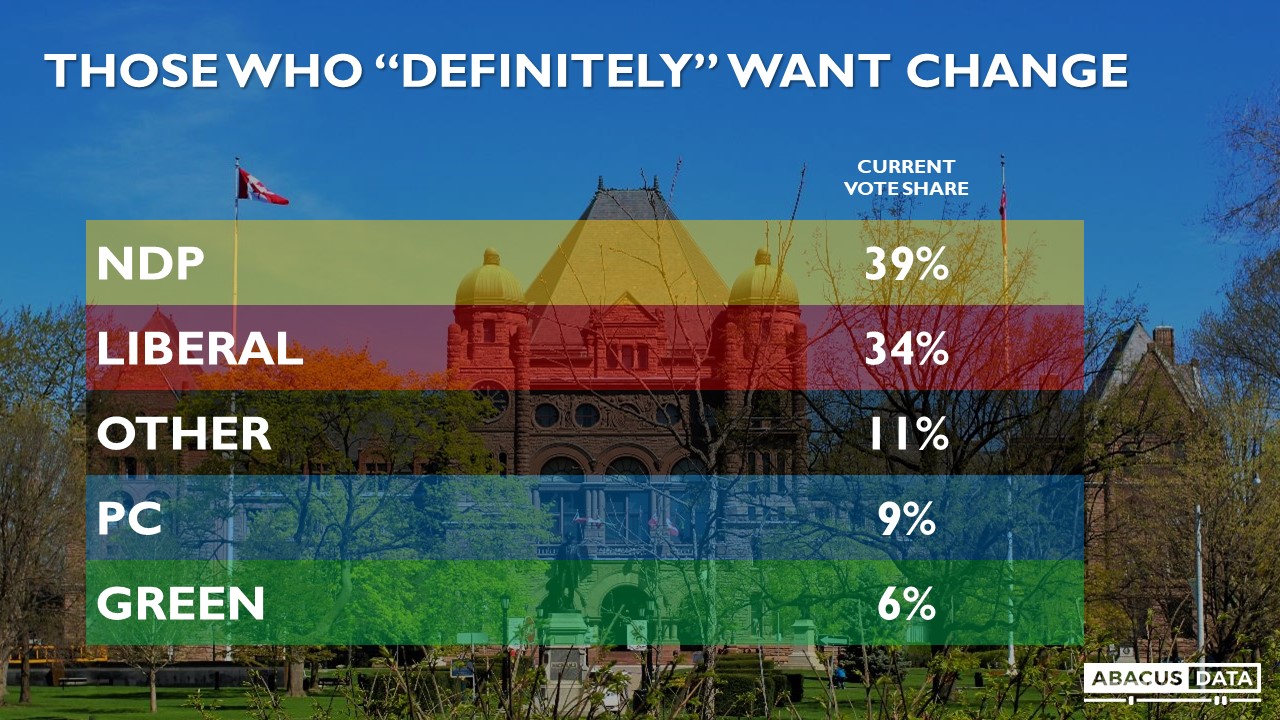
#3 – Fear of another PC government isn’t that high. Few think their lives will be better if they are replaced and few fear different outcomes if they are re-elected.
In this survey, respondents were asked how their life would be affected over four years if the PC government was replaced with another party after the election. Overall, 37% think their lives would be better (although 25% say it would only improve slightly) while 25% don’t think there would be much difference. 21% say their life would be worse while 17% are not sure.
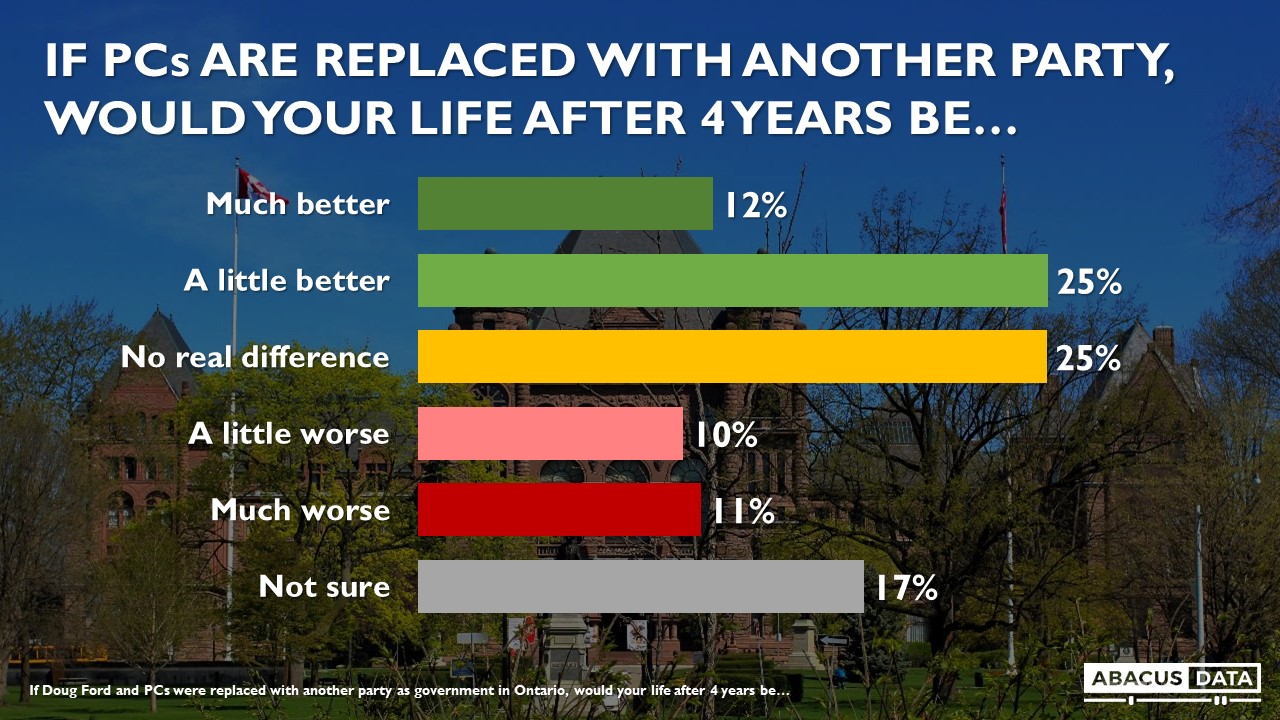
The relationship between the response to this question and vote intention shows how important it is for the Liberals and NDP to ligitate the case against another Ford government and how the PCs are benefiting from the sense that change wouldn’t make much difference to many people’s lives. Among those who think life would be better if the PCs were replaced, only 13% would vote PC while 41% would vote Liberal and 35% would vote NDP. Among those who think replacing the PCs would have little impact on their lives, the PCs lead the Liberals by 12. Among those who think their life would be worse if the PCs were replaced, the PCs are ahead by 52 points.
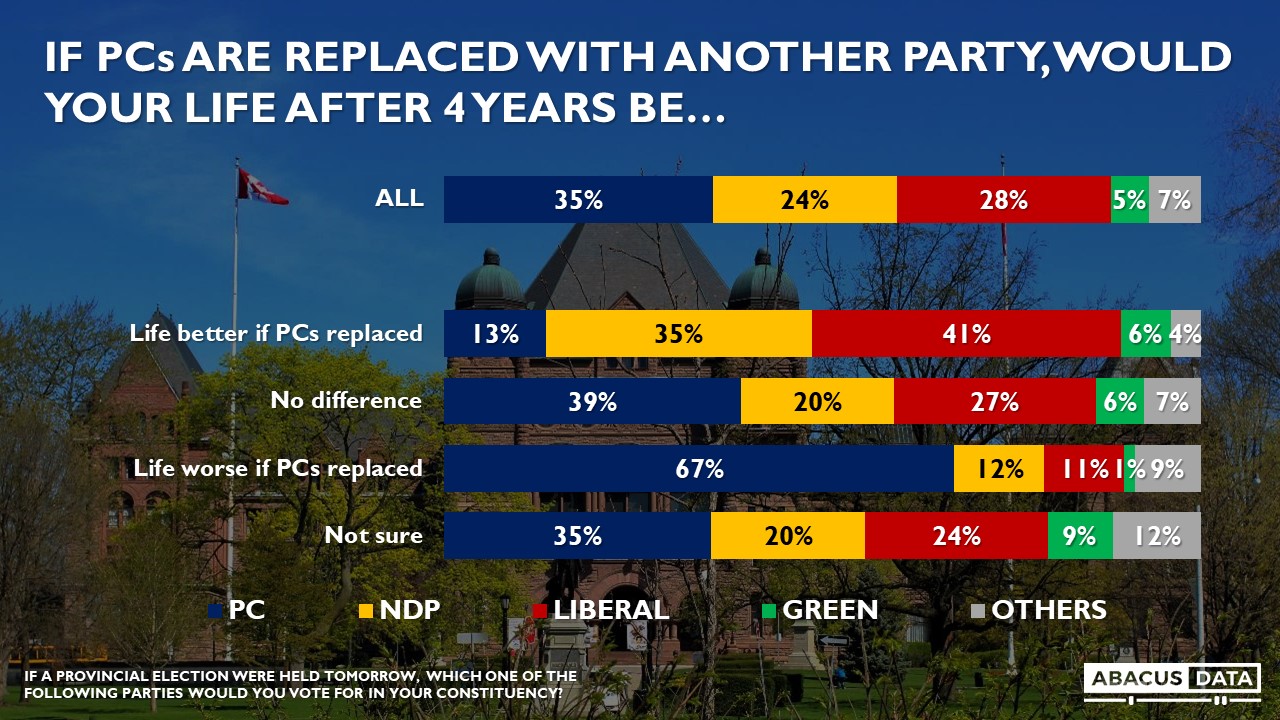
We also asked whether a re-elected PC government would make certain policy areas better, worse, or make no difference. The areas where more think the PCs would make things worse include the cost of living (43% worse), the amount of tax they pay (37% worse), and the quality of healthcare in the province (33% worse). But most respondents think a re-elected PC government would either make all these areas better or it wouldn’t make much difference.
For the PCs, this confirms a lack of “friction” in the campaign. Not enough voters fear them being re-elected. For the Liberals and NDP, these numbers will need to be much higher if they have any chance of defeating the government.
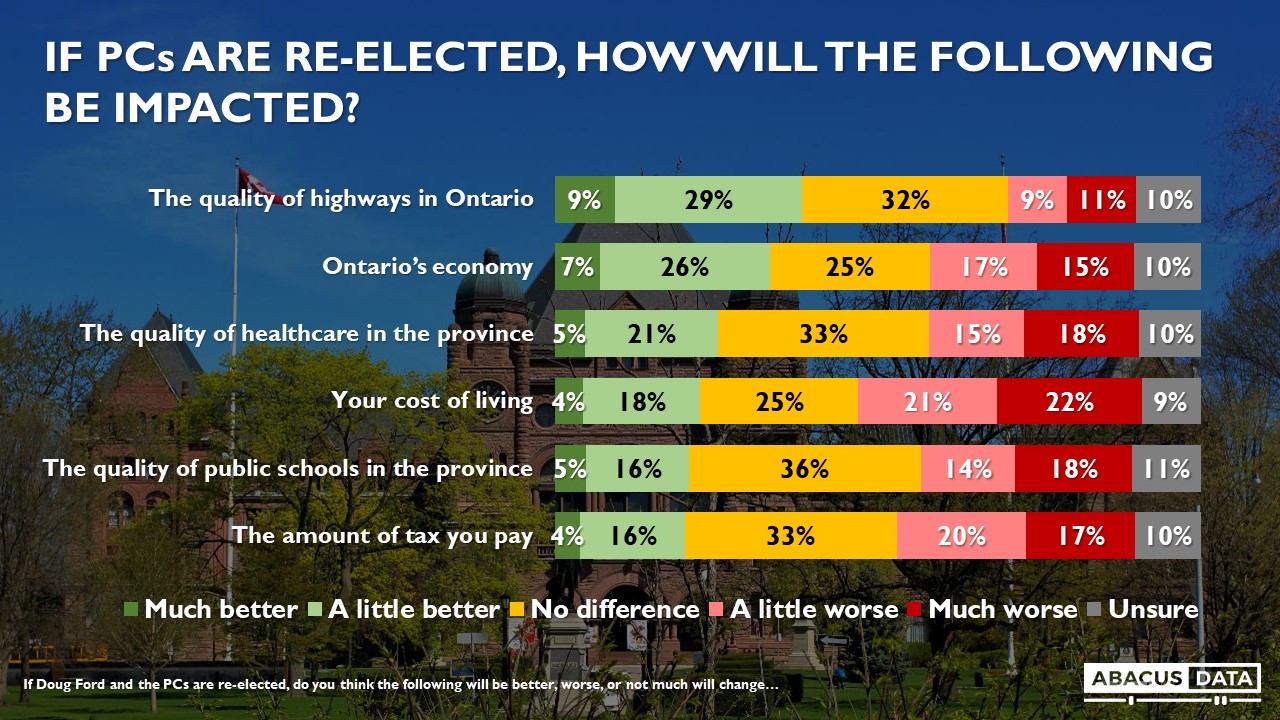
#4 – Doug Ford’s personal image has weakened since the start of the campaign. But neither Horwath nor Del Duca’s images have improved.
Since the start of the campaign, Doug Ford’s negatives are up 6-points to 44% while those with a positive view are down 5 to 33%. This is a significant shift over the past week.
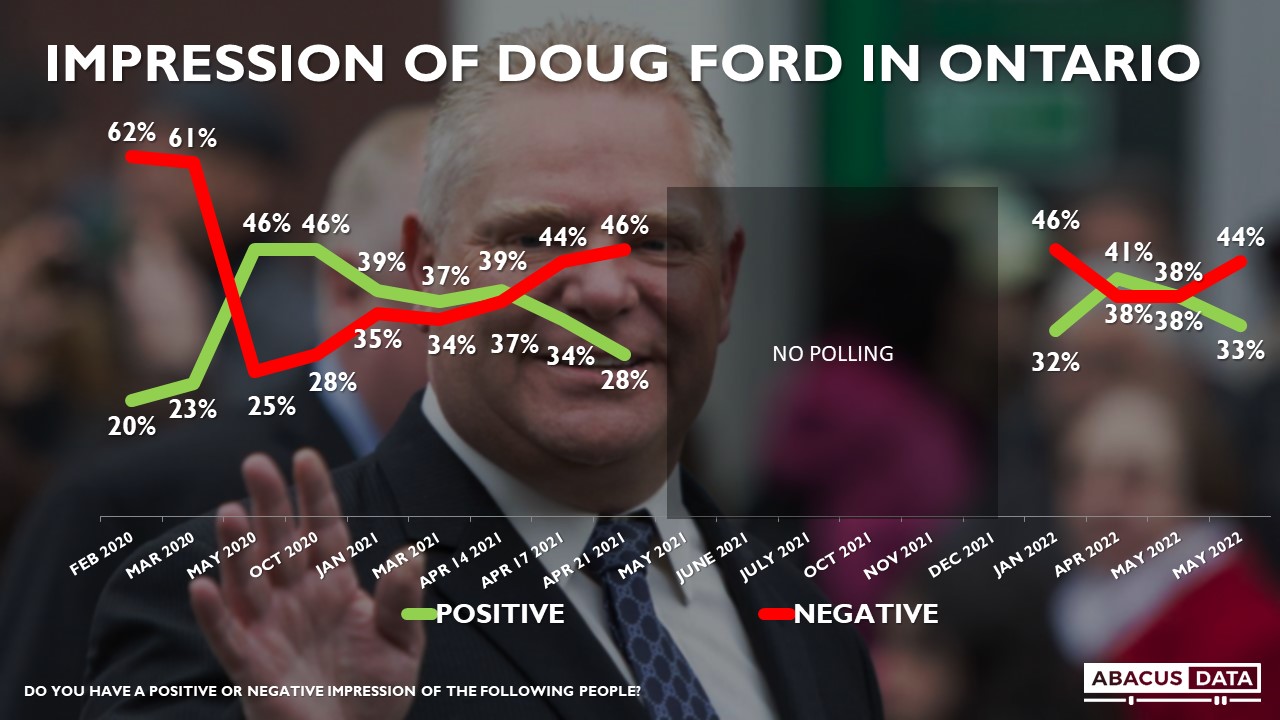
But despite this shift in views towards Mr. Ford, Ms. Horwath and Mr. Del Duca have seen little change in their own views and Mr. Ford remains the most popular leader in the province.
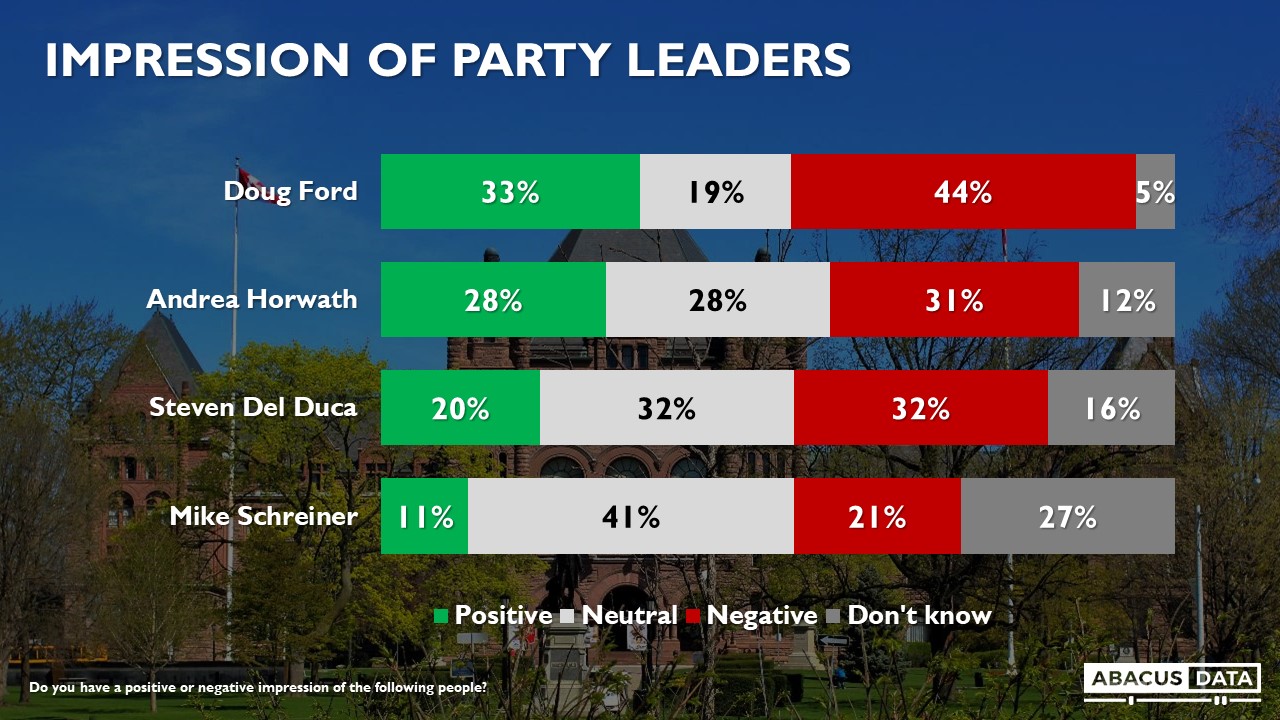
Despite the shift in Mr. Ford’s personal numbers, he remains well ahead on which leader would make the best premier. 34% pick Mr. Ford (down 1) followed by Ms. Horwath at 20% and Mr. Del Duca at 15%. 29% were unsure.
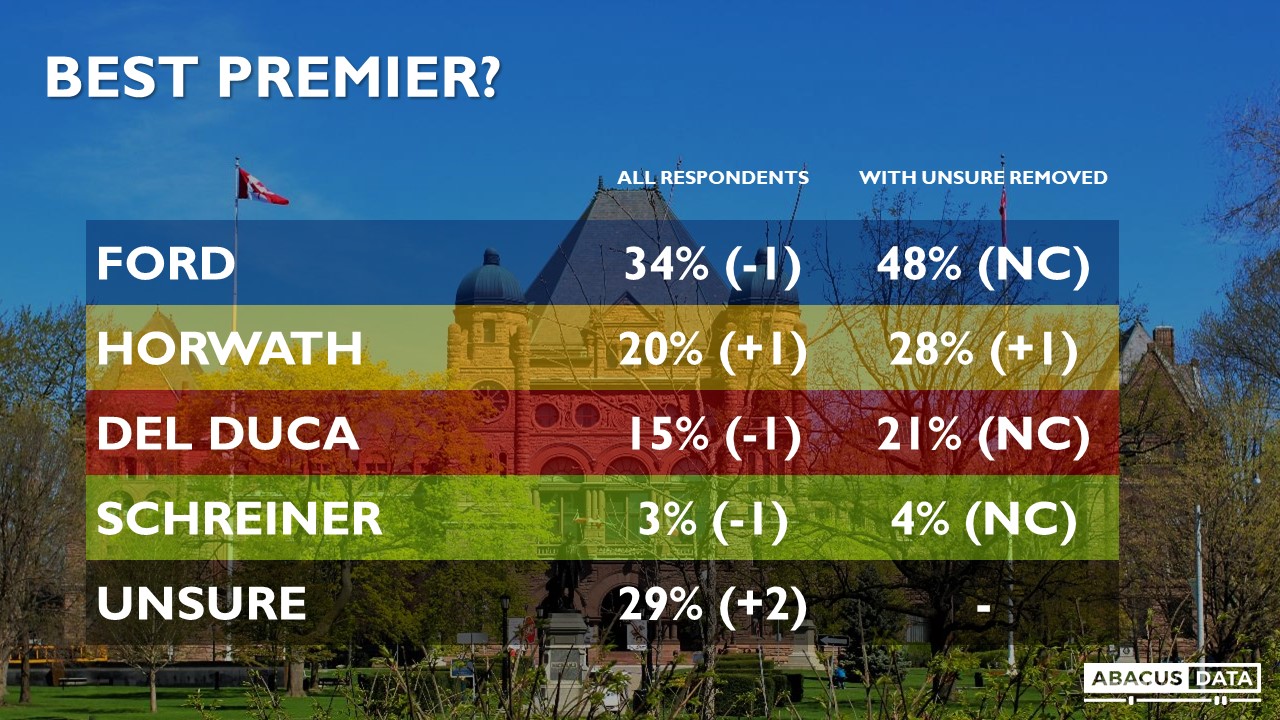
#5 – More still think the PCs will win the election with the NDP well back in third.
When asked which party they think will win the election, 42% think the PCs will win while 22% think the Liberals will. Only 11% think the NDP will win. This is largely unchanged from last week.
Despite efforts by the NDP to position themselves as the best able to defeat the PCs over the first week of the campaign, far more think the Liberals are better positioned to win than the NDP and may be a key factor in any effort to consolidate change voters over the next few weeks.
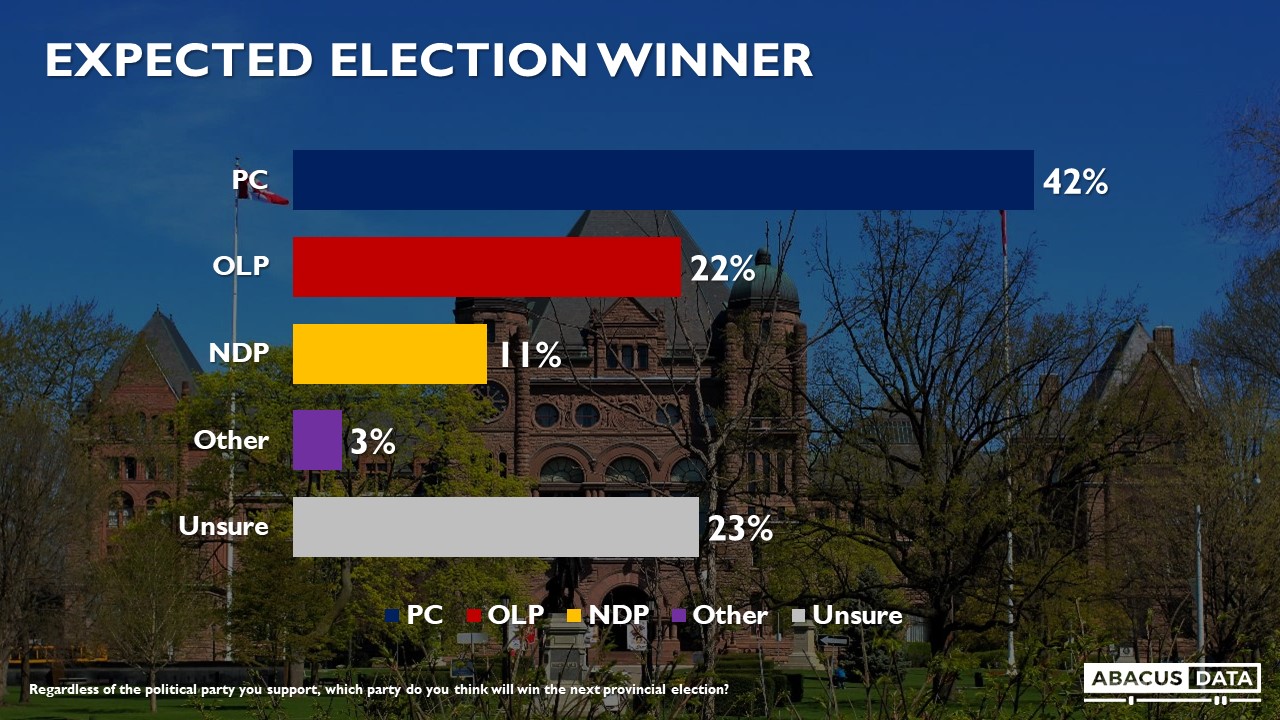
UPSHOT

According to David Coletto: “With less than three weeks to go, the election is still Doug Ford’s to lose. The Tories have a 7-point lead and hold strong leads outside Metro Toronto and among older voters. More importantly, given the low attention being paid to the campaign so far, Ford and the PCs are well ahead among those who say they will definitely vote.
There is little evidence that change voters are consolidating around either the Liberals or NDP, despite far more thinking the Liberals will win than the NDP.
If Ford’s negatives continue to rise, expect the desire for change to increase as well. There is still an opening for the opposition parties but with less than three weeks left, they will need to move more aggressively to make the case for change. Right now, too few fear another Ford government to raise interest in the campaign and encourage consolidation around an alternative.”
METHODOLOGY
The survey was conducted with 1,000 eligible voters in Ontario from May 12 to 15, 2022. A random sample of panelists were invited to complete the survey from a set of partner panels based on the Lucid exchange platform. These partners are typically double opt-in survey panels, blended to manage out potential skews in the data from a single source.
The margin of error for a comparable probability-based random sample of the same size is +/- 3.1% 19 times out of 20.
The data were weighted according to census data to ensure that the sample matched Canada’s population according to age, gender, educational attainment, and region. Totals may not add up to 100 due to rounding.
This survey was paid for by Abacus Data Inc.
Abacus Data follows the CRIC Public Opinion Research Standards and Disclosure Requirements that can be found here: https://canadianresearchinsightscouncil.ca/standards/
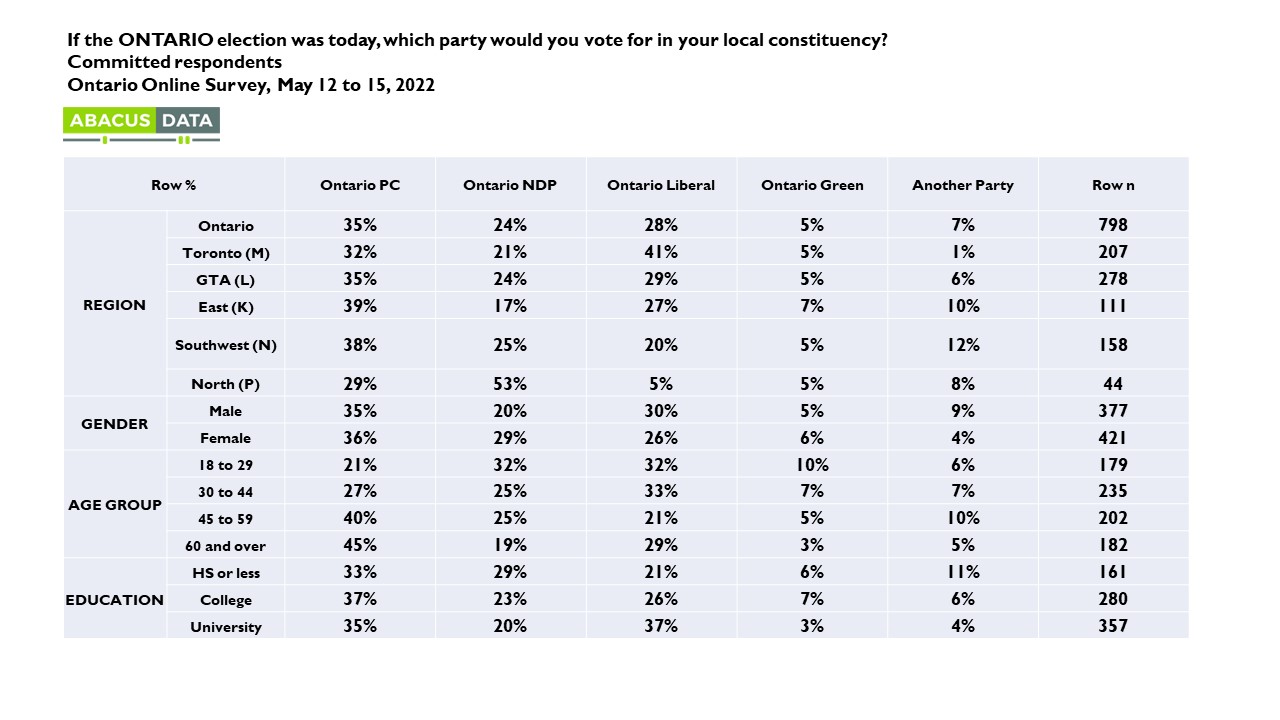
ABOUT ABACUS DATA
We are the only research and strategy firm that helps organizations respond to the disruptive risks and opportunities in a world where demographics and technology are changing more quickly than ever.
We are an innovative, fast-growing public opinion and marketing research consultancy. We use the latest technology, sound science, and deep experience to generate top-flight research-based advice to our clients. We offer global research capacity with a strong focus on customer service, attention to detail, and exceptional value.
We were one of the most accurate pollsters conducting research during the 2021 Canadian election following up on our outstanding record in 2019.
Contact us with any questions.
Find out more about how we can help your organization by downloading our corporate profile and service offering.



